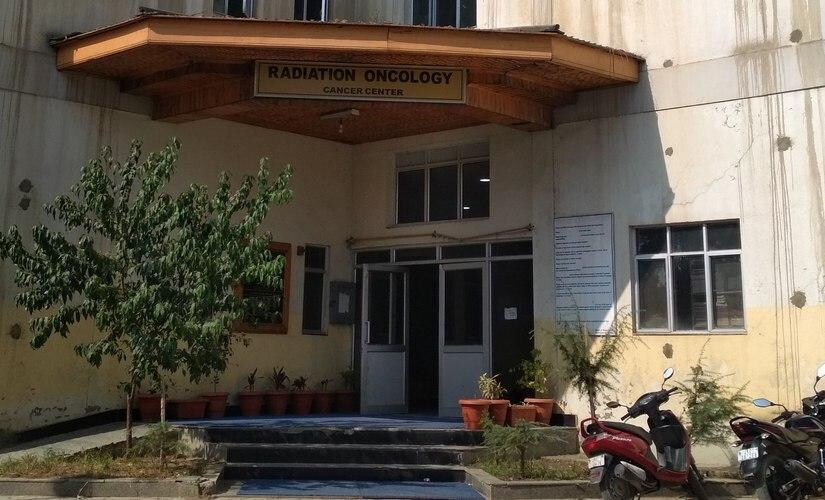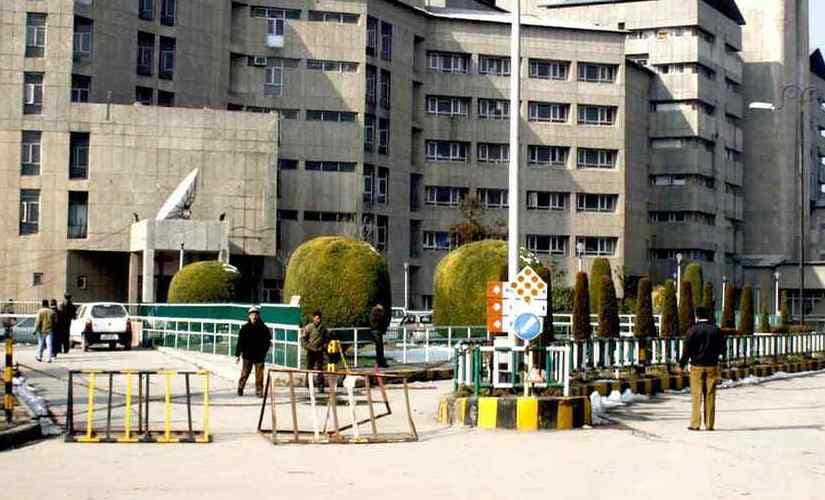Healthcare services in Kashmir have been badly affected for the past 73 days due to the communications blockade and lack of public transport. For patients suffering from chronic disease, reaching hospitals and contacting doctors, has become an exhausting task. Communications in Jammu and Kashmir have been blocked since 5 August after the Centre’s move to abrogate Article 370, which provided special status to Jammu and Kashmir and bifurcate the state into two union territories. Though postpaid mobile services resumed noon Monday and internet was restored at tourist spots, those with prepaid connections are still out of luck. When Ghulam Rasool Ahangar, a resident of Karhama area of Tangmarg left home on Wednesday to reach Shri Maharaja Hari Singh (SMHS) Hospital, which is affiliated with Government Medical College Srinagar he couldn’t get a vehicle. Ahangar, who underwent surgery in July, found himself waiting at the bus stand for a long time. Finally, a good Samaritan on a two-wheeler offered to give him a ride to Srinagar. “I can’t call my family since I don’t have a postpaid mobile connection,“Ahangar said. “I don’t have a private vehicle and finding public transport is impossible.” Hundreds of patients like Ahangar are having a tough time reaching hospitals as public transport remains off the roads. [caption id=“attachment_7515491” align=“alignnone” width=“825”]  Radiation Oncology Cancer Centre, Government Medical College Srinagar wears a deserted look. Mansoor Peer[/caption] Mohammad Shaban, suffering from anemia, is in the in-patient ward of SMHS Hospital. He came all the way from north Kashmir’s Bandipora just to see a doctor. “We don’t have such facilities. We are forced to travel to Srinagar for even minor ailments. My situation would have worsened if I hadn’t manage to come,” Shaban said. After checking with 20 attendants at a premier hospital in the Valley, Firstpost found only four had postpaid connections. With no word about the fate of those with prepaid connections, many attendants queued up to use these cellphones. Kashmir has nearly 66 lakh mobile subscribers, of which only 40 lakh postpaid connections were restored by the government on 13 October. On 9 October, Abdul Ahad Chopan, 75, a cancer patient from Arizal area of central Kashmir’s Budgam, left home with his wife and son. They were unable to hire a vehicle to take them to Shri Maharja Hari Singh (SMHS) Hospital, one of Srinagar’s major multi-specialty facilities. Chopan, his wife, and son Rameez Ahmad, had to walk almost 24 kilometres. “We walked from Arizal to Magam. We couldn’t get any vehicle until we reached Magam,” Ahmad said at SMHS, an associated hospital of Government Medical College (GMC) Srinagar. At Magam, they boarded a vehicle with hospital staff, and upon reaching the facility, took Chopan for a CT scan, which was originally slated for 27 September. “We had to miss two appointments due to the situation on the ground,” Ahmad, who is differently-abled said. “My father is also diabetic.” Ahmad, the breadwinner, is responsible for not just his parents, but also his three younger sisters. Ahmad, who runs a meat shop, said it is often a struggle to pay for his father’s medical treatment and the family’s expenses, adding that he requests neighbours to keep an eye on their home whenever they need to go to the hospital. Many attendants argue that the lack of public transport is worse than the communication blockade. Shabir Ahmad, who lives in Pulwama, said last week his cousin was admitted to SMHS Hospital. Shabir said the doctors asked him to arrange blood as the hospital had exhausted its supply. “We couldn’t arrange blood on the same day. A relative had to donate blood the next day,” he said, adding that prior to the communication blockade, patients’ families could easily make such arrangements by putting out a request on social media. In August, twenty doctors issued a public statement expressing concern about the public health situation in Jammu and Kashmir. The medical professionals from across India, in their open letter, expressed concern about the absence of functional ambulance systems, mental health challenges and pellet gun injuries. Now, patients and their families are unable to call for an ambulance even in an emergency. The fact that public transport has been suspended makes things all the more difficult. Across Valley hospitals, people are unable to inform their families about the death of loved ones or new additions to their families. An employee of SMHS Hospital, speaking on condition of anonymity, tells of such a tale: “Last week, we had a patient from Kupwara’s Karnah, which is around 200 kilometres from Srinagar. After the patient passed away, their attendants could not call home. The relatives learned of the patient’s death only when they came to the hospital two days later. Those without cars face a torrid time in reaching the hospital.” Arguably no one has it worse than those suffering from chronic disease. Among them is Ali Mohammad Ganie, a Budgam resident, who has been suffering from throat cancer for the past few years. Ganie said these past two months have been extremely difficult. On Friday, Ganie’s son Wahid Ahmad took him to SMHS Hospital — a 50 kilometre trip from their home — in his three-wheeler. “Inaccessibility is the problem we are facing. We’ve come to this hospital four times in the past two months in this three-wheeler,” Wahid said. In mid-August, the family faced a financial crunch. Wahid had to borrow from friends to arrange medicine for his father. Wahid complained that the suspension of internet made it difficult for him to register his father under the Pradhan Mantri Jan Arogya Yojana (PMJAY) — launched in December — under which poor patients can avail benefits. This, despite the government allowing patients to register offline. However, the nodal officer, Ayushman Bharat scheme**,** SMHS Hospital, speaking on the condition of anonymity, said those who had already registered are receiving benefits and that staff is working extremely hard. “We have hard copies of patient files. If we get 10 to 15 cases, we go to office of the insurance company to get their details registered,” he added. The official said due to the prevailing situation, hospitals are paying for the patients’ care under this scheme and will later be reimbursed by the government. He added the highest number of golden cards under this scheme have been distributed in Jammu and Kashmir. More than 12 lakh in the state have registered under the scheme. [caption id=“attachment_7515501” align=“alignnone” width=“825”]  Patients are finding extremely hard to commute to the Sher-I-Kashmir Institute of Medical Sciences in Soura. Mansoor Peer[/caption] “There was problem in August. From last week of August, Government of India allowed us to scan the documents of the patients’ offline. They get free medicines and treatment,” said Bhupinder Kumar, CEO, State Health Agency, Ayushman Bharat. A cancer patient at the Regional Cancer Centre (RCC) of Sher-I-Kashmir Institute of Medical Sciences (SKIMS), Soura — a major tertiary care facility in Kashmir located north of Srinagar — tells a similar tale. Noor Jahan, 60, has been suffering from breast cancer since 2017. A resident of a remote village in south Kashmir’s Shopian district, she said the past two months have been extremely difficult. Her husband, Wazir Ahmad Khan, said, “In August, we were unable to reach SKIMS as we couldn’t afford to come in a private vehicle,” he said. The opening of the state cancer institute at SKIMS, which was slated to be completed by September, has also been delayed. But Dr Farooq Jan, medical superintendent, SKIMS, said his hospital has not faced any difficulty in arranging medicine or managing patient care. “Our Outpatient Department handles over 3,000 patients a day. Surgeries are being performed normally,” Jan said. “We use our buses to bring staff from their homes.” He added that over the past two months, two ambulances and three buses were damaged in incidents of stone-pelting. Patients’ attendants complain that they are unable to order medicine online due to the internet being suspended. Mohammad Aarif, a Srinagar resident, said his mother and uncle, who both suffer from cancer, are unable to access medicine they previously purchased online. He said a life-saving drug was dispatched from the Mumbai branch of Pfizer, an American pharmaceutical corporation, but it is yet to reach Srinagar. “The drug, which was not available at government hospitals or at pharmacies, cost me Rs 50,000,” Aarif said. “My uncle and mother are being monitored by a doctor from Mumbai’s Tata Memorial Hospital. We could not update the doctor about their status after 5 August.” Private diagnostic centres are facing difficulties in completing investigations in cases that require sending samples out of state. Dr Nazir Hussain Chowdhary, medical superintendent, SMHS Hospital said the Outpatient Department saw a 30 percent decline in the number of patients in August and September. A senior faculty member at SKIMS — a major tertiary care-cum research institute — said the lack of internet over the past two months meant they were unable to conduct any research. “Postgraduate students and faculty members are unable to download research material as they can’t access the internet,” he said. The doctor added that many departments need to use the internet, especially in difficult cases or unusual cases. With prepaid mobile services and internet limited to tourist spots, doctors can’t talk to each other, find specialists or deliver critical information to patients. In areas where there are no landlines, patients can’t call in case of an emergency. Doctors Association Kashmir (DAK) president Dr Suhail Naik said the suspension of communication lines, now partly restored, has badly hit health services. “It has affected patient care to a large extent. People, especially those hailing from far-flung areas, are finding it difficult to reach hospitals.” “Communication is an integral part of healthcare. Earlier, we received instant feedback from specialists. Now, doctors are facing a tough time communicating with each other,” Naik said, adding that in medical college across the state, students are unable to complete their projects due to lack of internet. “Researchers have moved to libraries, but the material is out of date. They are having a hard time accessing study material,” he added.
Across Valley hospitals, people are unable to inform their families about the death of loved ones or new additions to their families
Advertisement
End of Article


)

)
)
)
)
)
)
)
)



